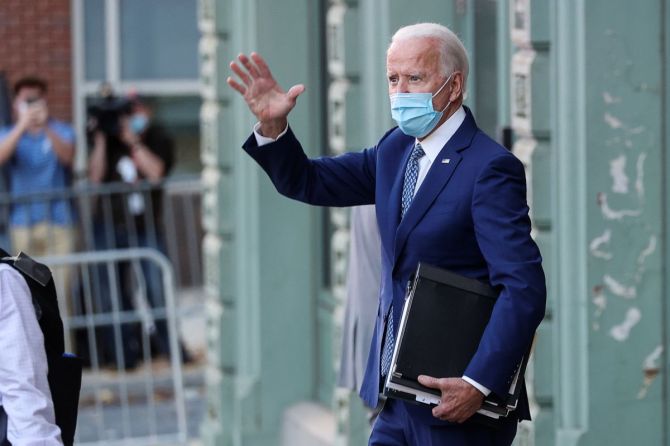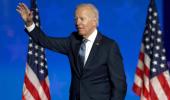'President-elect Biden, in particular, has deep knowledge of, and experience with, dealing with India, serving as a custodian and champion of the relationship long before it was fashionable to do so.'

Ronak Desai is an expert on law and foreign policy, with a particular focus on security. His work has covered covers India-US relations, enforcement of global law, corruption, and Indian American politics.
Desai is an associate at the Lakshmi Mittal South Asia Institute at Harvard University and is a private practice attorney at a prominent international law firm.
He is Law & Security Fellow at New America, a fellow at the Truman National Security Project, and an Asia 21 Leader at the Asia Society.
He serves as general counsel and board director to the Partnership for a Secure America, a bipartisan foreign policy think tank.
In an interview with Rediff.com Senior US Contributor P Rajendran, Desai discusses Verdict 2020 and its implications on the India US relationship n the concluding segment of a two-part interview.
While the executive has a lot of leeway in deciding foreign policy, there are times Congress does come into play.
Given the possibility of the Senate going to the Republicans, what chance is there of ratifying nominations -- including to the courts?
It's too early to know how President-elect Biden's nominees would fare under a Republican Senate although its leadership has signalled that it is likely to follow the same path of obstructionism that it under the last six years of the Obama presidency.
Biden's multi-decade career in the Senate could very well serve as an asset, and hopefully both parties will generate a list of consensus nominees that will allow critical vacancies to be filled and the country to move forward.
Irrespective of the outcome in Georgia, which will ultimately decide control of the chamber (the Senate), the debate over the utility and wisdom of the filibuster will continue to rage unabated.
You have argued in your columns that there will be no drastic change in US relations with India in a new administration.
But haven't Biden -- and Harris -- been critics of India's Kashmir policy and of its dealings with the minorities there?
How will that impact relations, especially given the improving security ties?
A Biden administration is incredibly well-positioned to propel the US-India strategic relationship to new heights.
President-elect Biden, in particular, has deep knowledge of, and experience with, dealing with India, serving as a custodian and champion of the relationship long before it was fashionable to do so.
He was among the sole voice calling for engagement and dialogue with India following the country's nuclear tests in 1998 and was among the first to call for sanctions to be dropped afterward.
He championed the transformative US-India civilian nuclear deal and enjoys longstanding relationships with India's leaders from both parties.
The US-India partnership enjoys a bipartisan consensus.
It doesn't matter which party is in power in Washington or New Delhi, the relationship will ultimately continue growing.
As a result, while we can generally expect continuity from a Biden Administration at a minimum, the countries are likely to experience an expansion of ties beyond the strategic and defense arenas.
These have seen the most growth under Trump and that have been characterized by a certain kind of narrow transactionalism that Biden is likely to abandon for a more multifaceted and sustained approach.
Biden has reiterated that he will serve as a dependable and committed friend to India, particularly given the turbulent geopolitical India realties India continues to confront on its borders.
The situation in Kashmir did not and will not change the underlying strategic logic of the US-India partnership.
China's aggression along India's border in August was a potent reminder of this salient fact.
US criticism of certain Indian actions in Kashmir have been bipartisan, as has US support for the country on various issues since revocation of Article 370 in August 2019.
Comments on Kashmir should not be construed as an exclusive barometer of the strength of US-India relations.
Friends as close as the United States and India should feel comfortable and confident speaking to each other frankly and constructively without fear of it damaging the foundations of the relationship.
The Kashmir issue should be no exception.

What do you think are the most significant areas -- outside the political -- that will change for India under a Biden administration?
We will see greater multidimensional cooperation under a Biden administration.
Strategic and defense collaboration will be a priority but not the only priority and we are likely to witness a surge in ties in a diverse host of arenas, particularly those with a multilateral focus, such as climate change.
New Delhi will welcome Biden's return to a multilateral approach, but will also be watching carefully for any early cues on the new president's approach toward China.
President Trump should be credited for removing any strategic ambiguity regarding America's posture toward Beijing, and India will not welcome any return to a less assertive status quo.
Even if they may be minor, what are the factors that are most likely to jeopardize the relationship?
The strong foundations of the US-India relationship mean that very few, if any, issues could truly jeopardize the partnership.
Rather, the same host of longstanding irritants that have bedeviled the relationship for years will resurface: Trade, intellectual property rights, and India's protectionist proclivities, for example.
None of these issues can or should hijack the relationship writ large, however.
The biggest challenges both countries are facing at present are internal -- those structural and systemic challenges internally are more likely to limit cooperation than anything else.
Feature Presentation: Aslam Hunani/Rediff.com










